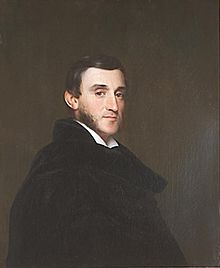Nicholas Brown III
Nicholas Brown III | |
|---|---|
 Nicholas Brown, painted by Charles Cromwell Ingham | |
| Lieutenant Governor of Rhode Island | |
| In office 1856–1857 | |
| Governor | William W. Hoppin |
| Preceded by | Anderson C. Rose |
| Succeeded by | Thomas G. Turner |
| Personal details | |
| Born | Nicholas Brown III October 2, 1792 Providence, Rhode Island, United States |
| Died | March 2, 1859 (aged 66) Providence, Rhode Island, United States |
| Nationality | American |
| Spouse(s) | Abby Mason Caroline Matilda Clements |
| Children | 5 |
| Parents | Nicholas Brown Jr. Ann Carter |
| Relatives | John Carter Brown II (brother) Nicholas Brown Sr. (grandfather) |
| Alma mater | Brown University (1811) Litchfield Law School |
Nicholas Brown III (October 2, 1792 – March 2, 1859) was the United States Consul to the Papal court from 1845 to 1853 and later was Lieutenant Governor of Rhode Island from 1856 to 1857, serving under Governor W. W. Hoppin.[1]
Early life[]
Nicholas Brown III was born on October 2, 1792, in Providence, Rhode Island, the eldest of three surviving children born to Nicholas Brown Jr. (1769–1841), the namesake patron of Brown University, and Ann Carter, daughter of John Carter, a prominent printer in Providence.[2] His younger brother was John Carter Brown II (1797–1874). His grandfather was Nicholas Brown Sr. (1729–1791), brother of John Brown, Moses Brown, and Joseph Brown, who was a merchant and slave trader who co-founded the College in the English Colony of Rhode Island and Providence Plantations which is today known as Brown University.[3]
He graduated from Brown University, which was founded by his family, in 1811 and attended the Litchfield Law School.[4]
Nicholas Brown III died on March 2, 1859.
Career[]
From 1845 to 1853, he was the United States Consul to the Papal court.[1] From 1856 to 1857, he served as Lieutenant Governor of Rhode Island, serving under Governor W. W. Hoppin.[5]
Personal life[]
In 1820, Nicholas married his cousin, Abby Mason (1800–1822), daughter of James Brown Mason. After her death, he married Caroline Matilda Clements (1809–1879) in 1831. They had five children, including:
- Alfred Nicholas Brown (1832–1864), who married Anne Mauran in 1857. Of their three children, only Nicholas Brown (1862–1891) lived to adulthood.[6]
- (1837–1903), in whose memory the Annmary Brown Memorial at Brown University was dedicated, and where she was laid to rest.[7]
- , (1841–1892)[8] whose husband, Italian diplomat Paul Bajnotti, erected a series of memorials after her death: the Bajnotti Memorial Fountain in Burnside Park, the Pancratiast Statue in Roger Williams Park, and Carrie Tower, the clock tower at Brown University.[9][10][11]
References[]
- ^ Jump up to: a b The classical spirit in American portraiture. 1976. ISBN 9780933519091.
Nicholas Brown III (1792-1859) spent the years 1845-1853 as the United States Consul in Rome. ...
- ^ "John Carter Brown, Inducted 2012". www.riheritagehalloffame.org. Rhode Island Heritage Hall of Fame. Retrieved 9 February 2017.
- ^ Miyoshi, Masao (January 1, 2009). Trespasses: Selected Writings. Duke University Press. ISBN 978-0822392484. Retrieved 9 February 2017.
- ^ "Litchfield Ledger - Student". www.litchfieldhistoricalsociety.org. Retrieved 2015-12-15.
- ^ William H. Jordy and Christopher P. Monkhouse (1982). Buildings on paper.
Nicholas Brown III, formerly American consul in Rome under Polk and later Lieutenant Governor of Rhode Island. ...
- ^ "Alva Woods papers". Rhode Island Archival and Manuscripts Papers Online. RIAMCO. Retrieved 15 August 2016.
- ^ "Brown, Annmary ()". Brown University Portraits. Brown University. Retrieved 9 May 2019.
- ^ DePaola, Gloria. "A Providence Love Story". Small State, Big History. Retrieved 9 May 2019.
- ^ Kirby, Brendan. "What happened to Bajnotti's money?". Rhode Show. WPRI. Retrieved 9 May 2019.
- ^ Coelho, Jamie (10 February 2017). "One Love, Three Ways Providence's greatest love story lives on". Rhode Island Monthly. Retrieved 9 May 2019.
- ^ Harrington, Daniel F. (6 September 2016). "Daniel F. Harrington: A romantic tribute by a famous widower". The Providence Journal. Retrieved 12 October 2016.
- 1792 births
- 1859 deaths
- Brown family
- American consuls
- 19th-century American diplomats
- Lieutenant Governors of Rhode Island
- Brown University alumni
- Litchfield Law School alumni
- 19th-century American politicians